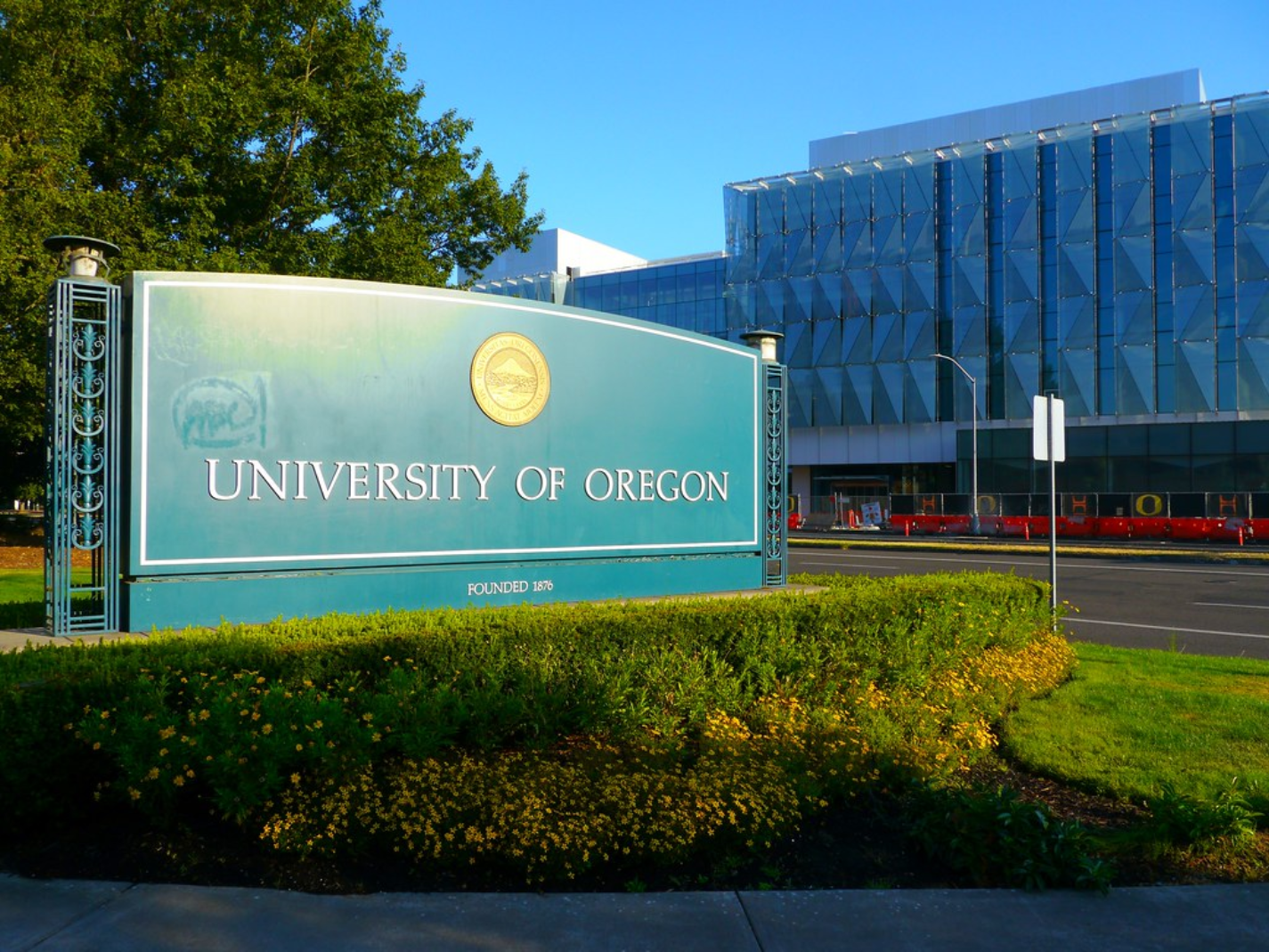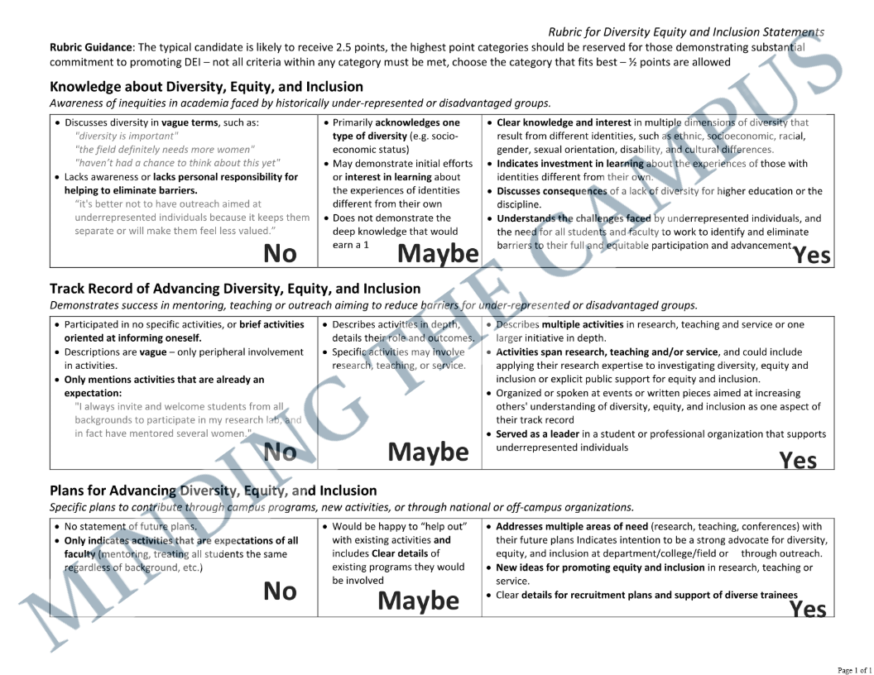
In today’s academic hiring process, “diversity, equity, and inclusion” (DEI) statements are a common requirement for faculty hiring across the United States.
As seen in a rubric obtained by Minding the Campus through a public records request, the University of Oregon evaluates DEI statements by awarding points to applicants based on their demonstrated “knowledge” of DEI, their “track record” in advancing DEI initiatives, and their “plans” for future DEI efforts. Applicants receive low scores for vague language, such as simply stating that “diversity is important,” or for making only superficial references to DEI topics.They score highly if they:
- demonstrate “clear knowledge and interest in multiple dimensions of diversity that result from the different identities, such as ethnic, socioeconomic, racial, gender, sexual orientation, disability, and cultural differences”
- understand “the challenges faced by underrepresented individuals, and the need for all students and faculty to work to identify and eliminate barriers to their full and equitable participation and advancement.”
Here is the rubric in full:

Oregon’s rubric rewards candidates who can demonstrate “deep knowledge” of “multiple dimensions of different identities.” This language suggests that what is privileged is an intersectional approach to identity and not, say, the personalist approach of John Paul II, which would not define the dimensions of diversity in these terms.
As noted by the National Association of Scholars (NAS), DEI requirements in hiring and tenure encourage “conformity to DEI orthodoxy,” prioritizing statements that align with prevailing DEI values over genuine insight or perspective. In a critique of DEI practices at the Los Angeles Community College District, I (Louis Galarowicz) argued that the DEI rubric compels speech, where applicants follow an unwritten script pre-determined by DEI ideology. I point out, such frameworks tend to “flatten all candidates into a single ideological mold,” stifling real diversity in thought and approach towards teaching, research, and otherwise.
Notably, the dimensions of diversity do not acknowledge intellectual diversity or diversity of viewpoints as a legitimate type of diversity to be sought. Viewpoint diversity safeguards against conformity and maintains the core values—free inquiry and untrammeled pursuit of truth—of the university. If these rubrics valued diversity in this truer sense of the term, understood in light of the mission and purpose of the institution, higher education might not be such a stultifying conformist place.
At their most anodyne, these rubrics might be a generic system to reward candidates who go above and beyond to help disadvantaged students. While such puritanical enforcement of do-goodery might be argued for, in their current practice, these rubrics select those who know what to say and do according to DEI’s definitions and concepts. It is straightforward to see how rubrics could be gamed, where some applicants may score highly by listing activities that align with DEI expectations. Candidates with genuine commitments to helping students could be unfairly evaluated next to candidates who engage or use the right language to feign engagement in DEI work, mainly for career advancement. In practice, candidates with unique perspectives or unfamiliar language may receive lower scores, regardless of their genuine commitment to DEI.
This kind of system could potentially overlook candidates with real experience and genuine commitments to helping people who simply don’t subscribe to the intersectional frameworks that the rubric prefers.
While Oregon’s DEI requirements appear to aim at fostering inclusivity, they actually stifling diversity of thought and reward ideological conformity. To truly uphold the values of diversity and academic freedom, institutions must recognize that DEI work extends beyond adopting popular terminology. By supporting a range of perspectives, especially those that challenge the reigning identitarian understanding of diversity, universities like Oregon can create truly inclusive campuses that honor genuine diversity and resist the pull of ideological conformity.
Image of University of Oregon sign on Franklin Boulevard by Rick Obst on Flickr
Universities lack diversity of thought–I don’t believe that for a minute. Maybe our difference of opinion depends upon differing definitions. I don’t think diversity of thought means hiring a professor in a math department that express the diverse thought that a slide rule is a better tool than a calculator. Some thoughts–although diverse–are not helpful when the goal is the creation of knowledge.
The logic escapes me of making hiring decisions based on logical fallacies! The logic escapes me of indoctrinating student in logical fallacies instead of teaching logic and facts.
The Lived Experience Fallacy
Timothy Hsiao
Academic Questions
Academic Questions
Articles
Summer 2022
Download PDF
DOI: 10.51845/35.2.7
https://www.nas.org/academic-questions/35/2/the-lived-experience-fallacy
Critical Race Theory in Six Logical Fallacies by Douglas Groothuis
https://www.nas.org/academic-questions/35/2/critical-race-theory-in-six-logical-fallacies
Is the University of Oregon more of any exemplar than any countless other campuses? What is the point?
Well considering the university is telling their own students that they should commit suicide and drown themselves, it appears to especially draw attention to Oregon; and the author’s points are well-taken by all except the Leftists and their concern trolls.